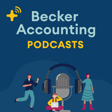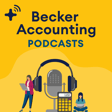
Cool Careers in Accounting Ep. 21 - Beyond Billable Hours: A Formula for Success in Accounting with Mike Maksymiw
Mike Maksymiw takes us through his inspiring career journey, blending his passion for accounting, mentorship, and innovation. From his days as a college baseball pitcher to his leadership role at Aprio, Mike shares insights on work-life harmony, the evolving role of technology in accounting, and the value of questioning norms and building meaningful professional relationships. Packed with practical advice and personal anecdotes, this interview is a must-listen for anyone looking to make a lasting impact in the accounting profession.
Earn CPE by listening to this podcast through a Becker Prime CPE subscription.
Listen to this episode through your Becker LMS platform to complete practice questions, pass the final exam, and earn CPE credit.
Already a Becker Prime CPE customer? Login here.
Have access to Becker CPE through your employer? Earn CPE credit for this podcast however you consume Becker CPE, either through your company’s LMS or via the Becker platform. Not sure where to log in? Check with your CPE admin.
Learn more about CPE Podcasts from Becker: https://www.becker.com/cpe/becker-podcasts


